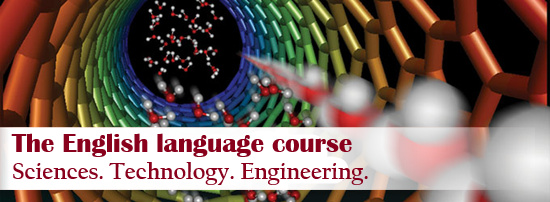Practical course supporting English language learning for the 2nd year students, semester 4
Course objective
The objective of the course is to develop students' English language communicative competency at the level that will enable them to function adequately in everyday life and in their general professional activity. The course covers such topics as sciences and the role of science in modern world, technology and types of technology, artificial intelligence, inventions and innovations, engineering, branches of engineering, units of measurement, graphs and diagrams, advances in science and technology.
Learning outcomes
After studying this course students should be able to demonstrate
KNOWLEDGE OF:
• English vocabulary and grammar that are necessary for successful oral and written communication in the fields related to the thematic scope of the course;
• relevant professional terminology and general scientific notions associated with sciences, technology, artificial intelligence, engineering, advances in science and technology;
• different methods for searching and analysing of information from various English language sources (oral and written);
SKILLS IN:
• understanding oral and written English related to sciences, technology, artificial intelligence, engineering, inventions and innovations;
• describing the science laws and technological products;
• generating written and oral statements using English in the situations related to the thematic scope of the course;
• describing graphs and diagrams using appropriate English;
• making and delivering presentations in English;
• writing essays and summaries;
• analysing written and oral English to express their agreement/disagreement and justify ther opinion;
• analysing scientific literature including articles, research papers in the field of engineering;
EXPERIENCE OF:
• presenting information in a variety of written, graphic and oral forms; constructing coherent arguments and articulating ideas clearly;
• analysing and explaining concepts/methods relevant to the scope of the course;
• developing and maintaining cooperative working relationships with groupmates;
• planning and organizing their independent study process through self-study, and, thus, developing their learner autonomy skills.
Education program
All undergraduate training programs:
05.03.06 «Geoecology»
21.03.02 «Land management»
21.03.01 «Construction and Operation of Technical Facilities in Petroleum Industry», «Development and Operation of Oil and Gas Fields»
18.03.01 «Chemical Engineering»
18.03.01 «Analytical Control in Chemical Industry»
21.05.02 «Petroleum Geology»
21.05.02 «Survey, Exploration, Engineering and Geological Study of Groundwater»
21.05.02 «Geological Survey, Prospecting and Exploration of Solid Mineral Fields»
21.05.03 «Geophysical Well Logging»
27.03.05 «Entrepreneurship Activities in Innovation»
01.03.02 «Applied Mathematics in Engineering»
09.03.01 «Programming of Computer and Telecommunication Systems»
54.03.01 «Industrial Design»
15.03.06 «Smart Mechatronic and Robotic Systems»
09.03.01 «Programming of Computer and Telecommunication Systems»
09.03.04 «Development of Software and Information Systems»
15.03.01 «Mechanical Engineering»
15.03.04 «Automation of Processes and Productions in Petroleum Industry»
13.03.01 «Power and Heat Engineering»
13.03.02 «Electrical Engineering»
13.03.02 «Power Engineering»
13.03.02 «Plasma-Beam and Electric Discharge Technologies»
14.05.02 «Design and Operation of Nuclear Power Plants»
11.03.04 «Applied Electronic Engineering»
12.03.01 «Information Systems and Technologies in Non-Destructive Testing»
12.03.01 «Construction and Operation of Technical Facilities in Petroleum Industry»
12.03.01 «Development and Operation of Oil and Gas Fields»
12.03.04 «Biomedical Engineering»
20.03.01 «Emergency Protection»
12.03.02 «Laser and Light Technology»
19.03.01 «Biotechnology»
22.03.01 «Materials Science and Technology»
03.03.02 «Physics»
14.03.02 «Nuclear Physics and Technology»
14.05.04 «Control Systems for Technological Processes and Physical Equipment»
18.05.02 «Chemical Technology of Nuclear Fuel Cycle Materials»
Course syllabus
Module 1. Sciences
(Branches of science, Scientific progress and famous scientists, Biomimicry and biomimetic inventions, Grammar, Test of achievement on 'Sciences', Supplementary material)
Module 2. Technology
(Types of technology, Artificial intelligence, Inventions and innovations, Grammar, Test of achievement on 'Technology', Supplementary material)
Module 3. Engineering
(Branches of engineering, Safety at work, Graphs and diagrams, Units of measurement, Grammar, Test of achievement on 'Engineering', Supplementary material)
Course duration, quantity characteristics, form of control
Course duration: 17 weeks
Course complexity: 3 credits/108 hours
Form of control: pass/fail exam
Author's profile
Copyright © 2020.
Томский политехнический университет. Все права защищены
Tomsk Polytechnic University, All rights reserved.

- Учитель: Демидова Ольга Михайловна